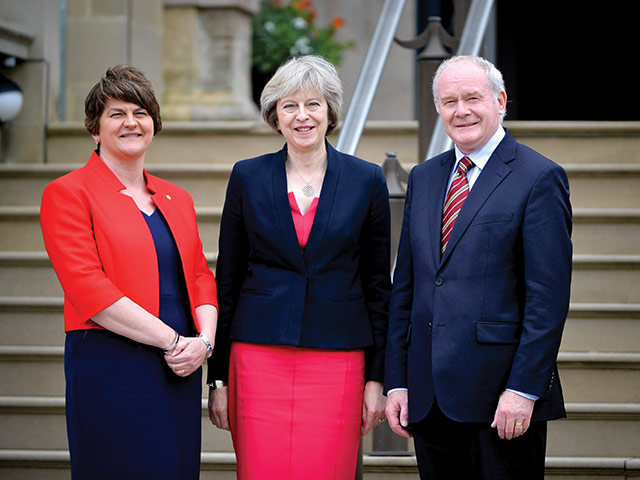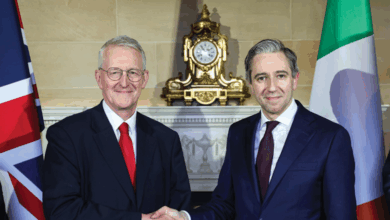Brief encounter
 One 90 minute visit. One TV camera. One journalist. One written question. As Northern Ireland fights to climb the priority rankings of the new British Prime Minister, Theresa May might have already given the clearest indication of our current status. David Whelan reports.
One 90 minute visit. One TV camera. One journalist. One written question. As Northern Ireland fights to climb the priority rankings of the new British Prime Minister, Theresa May might have already given the clearest indication of our current status. David Whelan reports.
Shortly after moving in to 10 Downing Street, David Cameron’s successor set about trying to install some calm within the regional economies in the wake of an unexpected victory for the Leave campaign during the EU referendum. Simple geography could explain why visits to Wales and Scotland pre-dated her trip to Northern Ireland, however, the manner of her visit to Stormont Castle left no room for speculation that Northern Ireland was to receive any form of special treatment.
Theresa May’s short and regimented inaugural visit as PM wasn’t the only recent indication that Stormont would have its work cut out if it wanted to be first to the trough for a post-Brexit serving. New Secretary of State James Brokenshire has rarely strayed from the script when faced with the local media, quickly snubbing any ideas of Northern Ireland remaining in the EU on a special case basis and dismissing a border poll on his first engagement at Belfast’s City Hall.
However, Brokenshire did stress that his role was to advocate the best interests of Northern Ireland at the heart of government, a more comforting rhetoric than that which came from the Secretary of State for Exiting the European Union, when he appeared to not fully understand the Irish border in a recent interview with Sky News. Speaking from a UK context, David Davis described the divide between northern and southern Ireland as an “internal border”. “One of our really challenging issues to deal with will be the internal border we have with southern Ireland, and we are not going to go about creating other internal borders inside the United Kingdom,” he said.
One thing that was for sure was that Theresa May wasn’t going to make any similar slips while in Northern Ireland, or provide any soundbites other than the rehearsed script. Gathered media were informed that May would not be taking questions and instead would deliver a statement to a single camera belonging to the BBC or UTV, which other media outlets could then attain. Opposition to the format then led to a change of tack. May allowed one single written question, pre-agreed to relate to her pre-referendum views that a Brexit would mean some form of border control in Ireland. The format led one local leading commentator to describe May’s style as a “North Korean-like media approach”.
Despite only lasting 90 minutes in total, a press statement from Downing Street, sent shortly after May had left and outlining the PM’s thoughts on the meeting with the First and deputy First Ministers, described the event as “very constructive, positive”.
May’s approach cut a stark contrast to that of Taoiseach Enda Kenny, who tried to open the communication channels with Stormont almost immediately after the referendum and even planned to propose an all-Ireland forum on Brexit before he was rebuffed by First Minister Arlene Foster during the first post-referendum North-South Ministerial Council at Dublin Castle. May’s handling of the media in Northern Ireland could be put down to a packed schedule and general uncertainty to the exact implications of a Brexit, before wider negotiations to facilitate the leave have taken place. The visit may have been a token gesture to ensure calm and hold the status quo, while her backroom team work on a carefully constructed plan of damage limitation. However, her approach may raise alarm bells for the Stormont Executive as to their place on her to-do list and a failure to return to Northern Ireland with a more complex and detailed approach on her next visit, could be a worrying sign for all involved.
Here is what she had to say:
“If you look ahead, what is going to happen when the UK leaves the European Union is that of course Northern Ireland will have a border with the Republic of Ireland, which will remain a member of the European Union,” said May.
“But we’ve had a common travel area between the UK and the Republic of Ireland many years before either country was a member of the European Union.
“Nobody wants to return to the borders of the past. What we do want to do is to find a way through this that is going to work and deliver a practical solution for everybody, as part of the work that we are doing to ensure that we make a success of the United Kingdom leaving the European Union, and that we come out of this with a deal which is in the best interests of the whole of the United Kingdom.”





